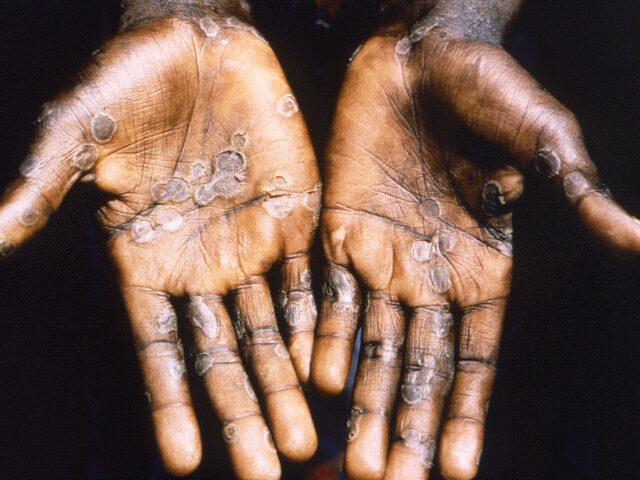World Health Organization (W.H.O.) Director-General Tedros Adhanom Ghebreyesus said on Sunday that he might declare an international health emergency due to the outbreak of monkeypox in the Democratic Republic of the Congo (DRC) and neighboring African countries.
DRC researchers warned in June that a new, faster-spreading, and more dangerous strain of monkeypox was spreading in the war-torn eastern half of the country. The new strain, known as Clade-1b, was originally detected among sex workers near the Rwandan border in September.
Monkeypox, which the W.H.O. later renamed “mpox” because its original name was deemed “racist and stigmatizing,” caused a brief worldwide health panic in 2022 when it suddenly began spreading in Europe and the United States. The panic subsided when it was learned that nearly all of the spread occurred among sexually promiscuous homosexual men, who proceeded to take sensible precautions, bringing the outbreaks under control with the help of effective medicines.
The new version of mpox spreads more aggressively and appears to be more likely to cause severe injury or death than the 2022 strain, which was very unpleasant but statistically rarely fatal. Ghebreyesus indicated growing concern that the new outbreak is spreading beyond the original epicenter of the DRC’s North Kivu province and crossing national borders.
Ghebreyesus said on Sunday:
As a deadliner strain of mpox spreads to multiple African countries, W.H.O., the African Centers for Disease Control, local governments, and partners are further scaling up the response to interrupt disease transmission. But more funding and support for a comprehensive response are needed.
“I am considering convening an International Health Regulations emergency committee to advise me on whether the outbreak of mpox should be declared a public health emergency of international concern [PHEIC],” he added.
PHEIC, the emergency classification Ghebreyesus referred to, is the W.H.O.’s highest level of alert. The W.H.O. declared a PHEIC over the novel coronavirus that was first detected in China in late January 2020. Comparable alerts were previously issued for the H1N1 influenza pandemic, Ebola, Zika, and poliomyelitis.
The W.H.O. director said in July that the Clade-1b variant of mpox was responsible for more than 11,000 infections and 445 deaths in the DRC in 2024. More cases were reported in Burundi, Kenya, and Uganda in July, suggesting international spread, although the number of infections reported in other countries is small so far.
“The uninterrupted human-to-human transmission for at least the last eight months, possibly more, has never been seen in mpox spread in the region before,” Sylvie Jonckheere, infectious disease adviser for Doctors Without Borders (RSF), said on Tuesday.
RSF experts worry that the more aggressive strain of mpox is spreading from remote mining sites in the North Kivu region — where workers frequently encounter animals, like rats and monkeys, that carry the disease — and could begin infecting packed refugee camps filled with Congolese citizens displaced by the civil war in their country.
The African Union on Friday reallocated $10.4 million in Covid-19 funding to “support Africa CDC’s efforts to continue to combat the mpox outbreak across the continent.” The increased funding is earmarked for lab testing, data collection, case management, and vaccines.
13 Days to Go: Matt Boyle Breaks Down Swing State Early Vote Totals

COMMENTS
Please let us know if you're having issues with commenting.